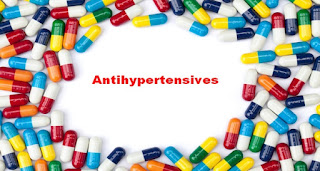 |
Thus patient education which is discussed in our previous post
is therefore an important aspect of hypertension treatment.
Antihypertension therapy involves the use of various classes of
pharmaceutical agents but the mostly used among them include the following:
Diuretics: This type of medication lowers blood pressure by
reducing the blood volume as a result of increased sodium and water excretion.
The special form of diuretics is the thiazide diuretics which is one of the
first-line drug treatments for hypertension because of its slight vasodilating
effect. It is taken either as monotherapy or in combination with calcium
channel blockers (CCBs), angiotensin-converting enzyme (ACE) inhibitors or
angiotensin II receptor blockers (ARBs).
Unfortunately none of the drugs used in antihypertensive therapy
is without adverse effects. Perhaps, the most pronounced adverse effect of the
thiazide diuretics is potassium depletion, which causes a feeling of fatigue
and weakness (and thus may make patient feel worse than he did before
treatment). This problem can be avoided however, by replacement of the
potassium, either in the form of medication (slow-k) or in the form of fruits
such as bananas and oranges that are high in potassium. Other possible side
effects of the thiazide diuretics are increased blood glucose, nausea and
cardiac arrhythmia.
It is contraindicated in patients with: gout, hypokalemia,
hypotension, renal failure, allergy to sulphur medication, lithium therapy and
it may worsen diabetes. They also decrease placental perfusion and adversely
affect the fetus so should be avoided in pregnancy. Examples of diuretics include:
hydrochlorothiazide or microzide, chlorthalidone or thalitone etc.
Direct Acting Vasodilators: They act directly on the smooth muscle
of arteries to relax their walls so that blood can move easily through them.
They are mostly used in hypertensive emergencies (180/120mmHg and above) or
when other drugs have failed and even so are rarely given alone. These drugs
may increase the cardiac output to the point that angina pectoris (the
sensation of chest pain , pressure, or squeezing, often due to ischemia of the
heart muscle from obstruction or spasm of the coronary arteries) or even myocardial infarction can occur.
Examples include; Nitropress (sodium nitroprusside), hydralazine, etc.
Sympathetic Blockers: This group of drugs reduces the workload on
the heart and open blood vessels causing the heart to beat slower and with less
force. When prescribed alone they don't work as well especially in older adults
but may be effective when combined with other blood pressure drugs. They may
cause depression of cardiac activity and bronchial contraction. Examples:
acebutolol (sectral), atenolol (tenormin), propranolol, etc.
Angiotensin-Converting Enzyme (ACE) Inhibitors: ACE inhibitors
relaxes blood vessels blocking the formation of a natural chemical (angiotensin
ll) that narrows blood vessels (vasocontriction). Examples; zestril, captopril,
benazepril, etc.
Angiotensin ll Receptor Blockers (ARBs): ARBs relaxes blood
vessels by blocking the action (not the formation) of a natural chemical
(angiotensin ll) that narrows blood vessels. They are called the Sartans,
examples include; losartan, valsartan, candesartan, etc.
Calcium Channel Blockers (CCBs): They relaxes the muscles of blood
vessels by blocking the entry of calcium into the muscle cell in the arterial
walls. A patient taking these medications should be discouraged from taking
grapefruit juice because it interacts with some CCBs and increases blood level
of the medication. Examples; amlodipine, diltazem, etc.
Renin Inhibitors: This group of drugs slows down the production of
renin, an enzyme produced by the kidneys that starts a chain of chemical steps
that increases blood pressure. A good example is alikiren (tekturna). Due to
risk of serious complications, including stroke, alikiren should not be taken
with ACE inhibitors or ARBs.


Hurrah, that's what I was looking for, what a information! existing here at
ReplyDeletethis website, thanks admin of this website.
Its like you learn my mind! You seem to understand a lot approximately this, such
ReplyDeleteas you wrote the e-book in it or something. I feel that you simply could do with a few percent
to force the message house a little bit, but other than that, this is great blog.
An excellent read. I will definitely be back.
Thanks
DeleteYou're welcome
ReplyDeleteI was suggested this web site via my cousin. I am no longer
ReplyDeletesure whether this put up is written through him as no one else recognize such certain about my problem.
You are wonderful! Thank you!
Thank you, I've recently been looking for info approximately this subject
ReplyDeletefor a while and yours is the best I've found out till now. However,
what concerning the bottom line? Are you sure in regards to the supply?
Aw, this was an extremely good post. Taking the time and actual effort
ReplyDeleteto produce a great article… but what can I say… I
hesitate a lot and don't seem to get nearly anything done.
Generally I don't read post on blogs, but I
ReplyDeletewould like to say that this write-up very compelled me to take
a look at and do it! Your writing style has been surprised me.
Thanks, quite nice post.
I am not sure where you're getting your info, but great topic.
ReplyDeleteI needs to spend some time learning much more or understanding more.
Thanks for magnificent info I was looking for this information for my mission.
I will right away take hold of your rss feed as I can not
ReplyDeletefind your e-mail subscription link or e-newsletter service.
Do you have any? Please let me understand so that I may just subscribe.
Thanks.
This blog was... how do I say it? Relevant!! Finally I have found something that helped me.
ReplyDeleteThank you!
Pretty! This has been a really wonderful article. Thanks for providing this info.
ReplyDelete